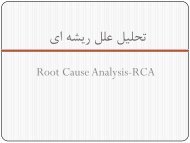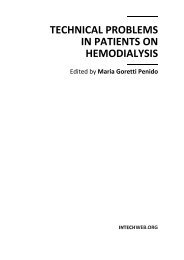new insights into the prevention and treatment of bulimia nervosa
new insights into the prevention and treatment of bulimia nervosa
new insights into the prevention and treatment of bulimia nervosa
You also want an ePaper? Increase the reach of your titles
YUMPU automatically turns print PDFs into web optimized ePapers that Google loves.
18<br />
New Insights <strong>into</strong> <strong>the</strong> Prevention <strong>and</strong> Treatment <strong>of</strong> Bulimia Nervosa<br />
significance <strong>and</strong> dominance <strong>of</strong> interpersonal <strong>and</strong> emotional relationships over drives in <strong>the</strong><br />
process <strong>of</strong> mental development <strong>of</strong> an individual [Waller, Kauffman, Teutsch]. Similarly, <strong>the</strong><br />
major <strong>the</strong>rapeutic <strong>and</strong> diagnostic assumptions <strong>of</strong> psychodrama refer to a dominant role <strong>of</strong><br />
psychological-<strong>and</strong>-social underpinnings <strong>of</strong> an individual’s behaviour <strong>and</strong> reactions. In<br />
psychodrama <strong>the</strong> main stress is put on an individual’s potential ra<strong>the</strong>r than on <strong>the</strong> specific<br />
psychopathology. However, symptoms <strong>of</strong> <strong>the</strong> pathology are not disregarded in <strong>the</strong><br />
<strong>the</strong>rapeutic work on <strong>the</strong> stage.<br />
In both <strong>of</strong> <strong>the</strong> aforementioned <strong>the</strong>rapeutic approaches, considerable significance is attached<br />
to <strong>the</strong> concept <strong>of</strong> an encounter, interpreted in psychodrama as <strong>the</strong> phenomenon <strong>of</strong> “being<br />
toge<strong>the</strong>r; a reciprocal encounter; empathy <strong>and</strong> sharing; mutual underst<strong>and</strong>ing; intuitive<br />
insight” [Glickauf- Hughes, Wells, Jay, Blatner, Goldmann, Morrison]. Such an<br />
interpretation corresponds to <strong>the</strong> role that an encounter plays in psychodynamic<br />
psycho<strong>the</strong>rapy, which relies on empathy <strong>and</strong> <strong>the</strong> so called “au<strong>the</strong>ntic patient-<strong>the</strong>rapist<br />
relationship”, as well as on <strong>the</strong> <strong>the</strong>rapist’s intuition used to develop insight <strong>and</strong> to take<br />
corrective action aimed at establishing an emotional relationship. Thus, <strong>the</strong> concept <strong>of</strong><br />
encounter is considered to be equally significant in both <strong>the</strong>rapeutic approaches.<br />
3. Characteristics <strong>of</strong> psychodrama applied in psychodynamic psycho<strong>the</strong>rapy<br />
for patients suffering from <strong>bulimia</strong> <strong>nervosa</strong> – a psychological diagnosis <strong>of</strong><br />
<strong>the</strong> self-image <strong>and</strong> self-feelings<br />
Some <strong>of</strong> <strong>the</strong> core psychodrama techniques, applied to investigate bulimic symptoms <strong>and</strong><br />
psychological mechanisms <strong>of</strong> this disorders include role reversal, role training, doubling,<br />
mirroring <strong>and</strong> surplus reality.<br />
In role reversal, <strong>the</strong> protagonist reverses his or her role with ano<strong>the</strong>r person (an auxiliary<br />
ego) on <strong>the</strong> psychodrama stage. This gives <strong>the</strong> patient-protagonist a chance to enact<br />
particular situations, inner thoughts, behaviours or o<strong>the</strong>r states from his or her life which<br />
are related to <strong>the</strong> significance <strong>of</strong> food, body parts <strong>and</strong> feelings in <strong>the</strong> patient’s life. Thus, role<br />
reversal allows <strong>the</strong> individual to increase his or her self-awareness, <strong>and</strong> gain insight <strong>into</strong><br />
how <strong>the</strong> person reacts in such life situations as feeding, eating, or <strong>the</strong> mo<strong>the</strong>r-child<br />
interaction. Role reversal provides invaluable experiential insight through seeing oneself<br />
from <strong>the</strong> perspective <strong>of</strong> ano<strong>the</strong>r. The auxiliary ego helps <strong>the</strong> protagonist explore his or her<br />
unconscious conflicts. The role <strong>of</strong> an auxiliary ego (in monodrama <strong>the</strong> role is assigned to an<br />
object or a director) is to “give voice” to inner thought <strong>and</strong> feelings <strong>the</strong> protagonist does not<br />
yet feel able to express. It is through a dialogue with <strong>the</strong> auxiliary ego, accompanying <strong>the</strong><br />
fur<strong>the</strong>r role reversals, that <strong>the</strong> protagonist explores his or her unconscious mind <strong>and</strong> is able<br />
to make corrections to <strong>the</strong> dysfunctional behaviours. The protagonist enters <strong>into</strong> a dialogue<br />
with him/herself on <strong>the</strong> psychodrama stage. Reversing roles with his or her stomach or<br />
o<strong>the</strong>r important body part, a <strong>bulimia</strong> sufferer has a chance to find out about <strong>the</strong> unconscious<br />
feelings towards <strong>the</strong>se parts, <strong>and</strong> recognize <strong>the</strong> destructive behaviours <strong>the</strong> person tended to<br />
engage in. Consequently, as a result <strong>of</strong> this powerful confrontation technique, <strong>the</strong> patient is<br />
able to introduce positive changes <strong>into</strong> his or her bahaviour.<br />
The mirror technique involves ano<strong>the</strong>r member <strong>of</strong> <strong>the</strong> group mirroring <strong>the</strong> protagonist’s<br />
postures, gestures, <strong>and</strong> words as <strong>the</strong>y appeared in <strong>the</strong> enactment. The protagonist observes<br />
his or her own bahaviour as reflected by ano<strong>the</strong>r person, watches <strong>the</strong> enactment <strong>of</strong><br />
him/herself from outside, adopts <strong>the</strong> so called metaposition <strong>of</strong> an audience member, an<br />
observer, <strong>and</strong> his or her role on <strong>the</strong> stage is acted out by a double. The mirror <strong>and</strong> double



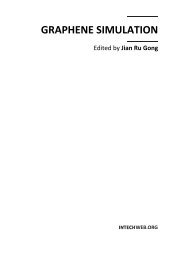
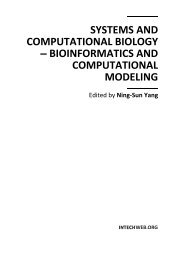



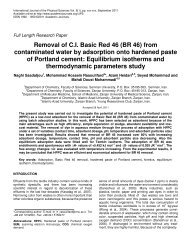

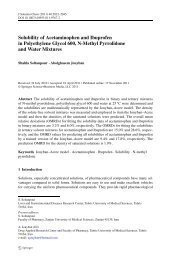
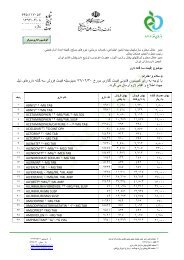

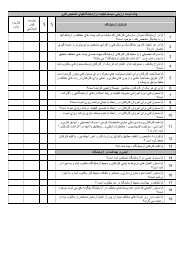
![focuspdca.ppt [Compatibility Mode]](https://img.yumpu.com/22859457/1/190x146/focuspdcappt-compatibility-mode.jpg?quality=85)
